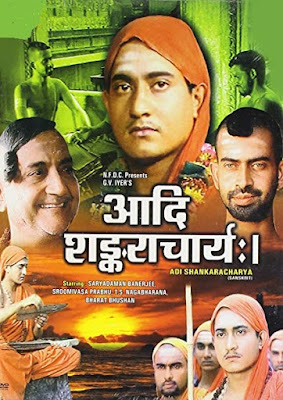1. A. Neecha Nagar
Neecha Nagar, a 1946 Hindi-Urdu film directed by Chetan Anand,
written by Khwaja Ahmad Abbas and Hayatullah Ansari and produced by Rashid
Anwar, was a pioneering effort in social realism in Indian cinema. It starred
Chetan Anand’s wife Uma Anand with Rafiq Ahmed, Kamini Kaushal, Rafi Peer and
Zohra Sehgal.
Neecha Nagar became the first Indian film to gain recognition
at the Cannes Film Festival, after it shared the “Grand Prix du Festival
International du Film” (Later known as “Palme d'Or”) award at the first Cannes
Film Festival in 1946. It's the only Indian film to be awarded a Palme d'Or
till date.
Neecha Nagar was inspired by Russian writer Maxim Gorky’s “The
Lower Depths”, one of his best known plays. Neecha Nagar was the debut film of
actress Kamini Kaushal and Pandit Ravi Shankar as a music director.
2. B. Adi Shankara
Adi Shankaracharya is a 1983 Indian film in Sanskrit language
directed by G. V. Iyer. The film depicts the life and times of 8th century
Hindu philosopher, Adi Shankaracharya, who consolidated the doctrine of Advaita
Vedanta (Non-dualism) in Hindu philosophy. It was the first film in India to be
made in Sanskrit. At the 31st National Film Awards in 1983, it won four awards,
including Best Film, Best Screenplay, Best Cinematography and Best Audiography.
Sarvadaman Banerjee (best known for playing Krishna in
Ramanand Sagar's popular Television series "Krishna" in 1993) played the role of “Adi
Shankaracharya”, while veteran actor Bharat Bhushan played Shankara's father.
M. Balamuralikrishna, veteran Carnatic vocalist, music
composer scored the music for the film.
3. A. Yaadein
Yaadein, a 1964 black and white Hindi
film directed and produced by Sunil Dutt also starring himself (the only other
actor in the film is Nargis Dutt that too in a silhouette in the final scene), is
the first Indian film in cinema that features only a single actor and hence has
found an entry in the Guinness Book of World Records in the category “Fewest
actors in a narrative film”.
Film narrative progresses through
dialogues and background music composed by Vasant Desai, who also scored two
songs sung by Lata Mangeshkar.
The film was a unique attempt since
it was a soliloquy act (monologue) performed by Sunil Dutt, in the role of a
worried loving husband, who is surprised to see his wife and children not at
home one day as he returns from the work. Making his own assumptions, he starts
imagining about the reason for their absence and in turn begins talking to
himself about his own mistakes and regrets.
The film won the National Film Award
for “Best Feature Film in Hindi” in 1964.
4. C. Kannada
The Kannada Film Industry is known as “Sandalwood”, one of the
many film industries around the world to mimic the Hollywood-pattern (- wood)
name. Karnataka, known for its sandalwood (Mysore Sandal) inspired the prefix
“Sandal”.
5.
A. Water
'Water' is
a 2005 drama film, written and directed by Deepa Mehta, produced by her Canadian
husband David Hamilton with screenplay by Anurag Kashyap. The film is the third
and final installment of Mehta's Elements trilogy - preceded by Fire (1996) and
Earth (1998). The film starring Seema Biswas, Lisa Ray, John Abraham, and
Sarala Kariyawasam in pivotal roles and Kulbhushan Kharbanda, Waheeda Rehman,
Raghuvir Yadav, and Vinay Pathak in supporting roles, is set in 1938 and
explores the dark lives of widows at an ashram in Varanasi and covers
controversial subjects such as misogyny and ostracism.
The Film’s
songs were composed by A. R. Rahman with lyrics by Sukhwinder Singh and Raqeeb
Alam while the background score was composed by Mychael Danna (Canadian film
score composer best known for his soundtrack for “Life of Pi”). The outstanding
Cinematography of the film was done by Giles Nuttgens, who has worked with
Deepa Mehta on several of her films.
The film
premiered at the 2005 Toronto International Film Festival, where it was
honoured with the Opening Night Gala and released in India on 9 March 2007
after several controversies.
Water was
Canada's official entry for "Academy Award for Best Foreign Language Film" in
2006.

















No comments:
Post a Comment